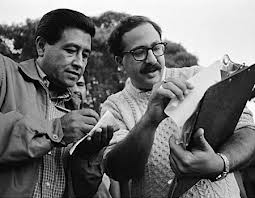Why Did the Mono Lake Campaign Succeed?
What Makes for Successful Social Movements, Especially in Environmental Politics?

Environmentalists celebrate the campaign to save Mono Lake as one the iconic triumphs in US environmental history. As well they should. But why did it succeed? It’s a critical question not just for environmentalists, but for any scholar or member of social movements.
In a previous post, I have suggested that the identity of the adversary — in this case — the Los Angeles Department of Water and Power — serves as a key variable. Arrogant and reactionary, LADWP could unify just about everyone against, and very few in favor of it — even water customers from the City of Los Angeles. But while that is a plausible hypothesis, I had never really developed a way to test it.
But some light has emerged, from a relatively unlikely source: Marshall Ganz’ wonderful book Why David Sometimes Wins: Leadership, Organization, and Strategy in the California Farmworker Movement. Ganz argues — with a good deal of success — that Cesar Chavez’ United Farm Workers’ movement triumphed not because of Chavez’ leadership skills (although they were great, at least initially) and not even because of favorable political conditions (although they certainly helped), but rather because the UFW was able to develop the “strategic capacity” to find alternatives to traditional tactics and strategies, develop outside allies, and continually learn while it was organizing.
What’s more interesting for our purposes, however, is how Ganz seeks to demonstrate his thesis. He compares the UFW to two other entities that were trying to organize the fields at the same time, viz. the AFL-CIO and the Teamsters. Both of these organizations were stronger, more entrenched, wealthier and more politically powerful than the UFW, but, Ganz contends, they lacked the strategic capacity to find innovative solutions to external problems and the internal ability to learn that hampered that internal efficacy.

Fair enough. I find much, though not all, of Ganz’ book persuasive. But then let’s go back to Mono Lake. No scholar can reproduce Ganz’ precise methods of investigating the efficacy of Mono Lake Committee because no one else was trying to gain exclusive control over the “defend the lake” movement. There were, however, several other environmental movements around the same time that failed. It would make sense, then, to compare the Mono Lake effort to those efforts 1) to test Ganz’ thesis; 2) to test mine (at least) partially; and 3) to generate new hypotheses for the successful or failure of social movement, especially environmental social movements.
Thus, a bleg. Which failed environmental movements, particularly of the 70’s and early 80’s, might form a useful comparison case for Mono Lake? The time period is crucial, in my view: this was a good time for environmental politics, especially in California, so to make the comparison fair, one has to get the time right. Moreover, it should relatively discrete: you can’t make good comparisons between Mono Lake, and, say, “water quality” or “oceans.” it would be best to find another campaign to save, well, a like, but that’s hard: maybe a relatively discrete species.
So what about it? What’s a good comparison? And what can we say about why it failed?





One Reply to “Why Did the Mono Lake Campaign Succeed?”
Comments are closed.